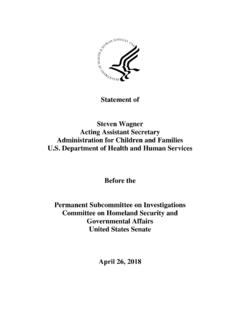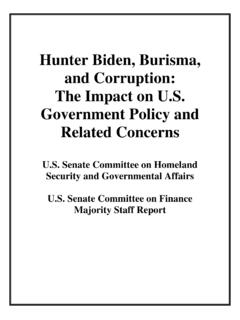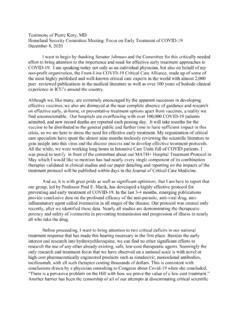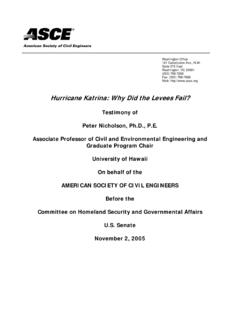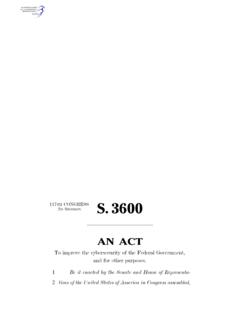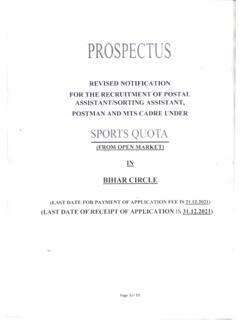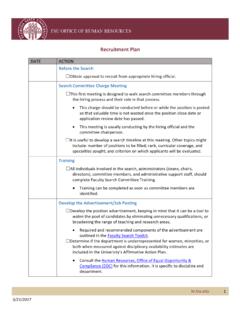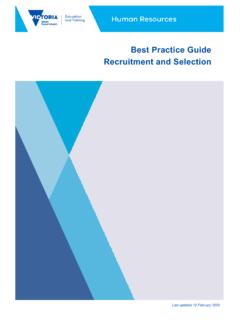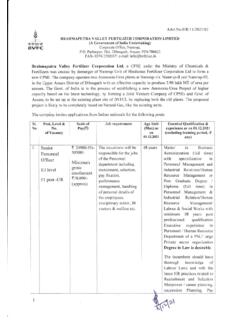Transcription of Threats to the U.S. Research Enterprise: China’s Talent ...
1 United States Senate PERMANENT SUBCOMMITTEE ON INVESTIGATIONS Committee on Homeland Security and Governmental Affairs Rob Portman, Chairman Tom Carper, Ranking Member Threats to the Research Enterprise: China s Talent recruitment Plans STAFF REPORT PERMANENT SUBCOMMITTEE ON INVESTIGATIONS UNITED STATES SENATE i Threats to the Research Enterprise: China s Talent recruitment Plans TABLE OF CONTENTS I. EXECUTIVE SUMMARY .. 1 II. FINDINGS OF FACT AND RECOMMENDATIONS .. 7 III. BACKGROUND .. 14 A. China s Goal to be the Science and Technology Leader by 2050 .. 14 1. From Brain Drain to Brain Gain .. 15 2. China s Systematic Targeting of Critical Technologies .. 17 3. China s Military-Civilian Fusion Strategy .. 18 4. China s Strategic Plan for Talent recruitment .
2 20 B. Congressional Testimony on Chinese Talent recruitment Plans .. 30 C. China Deletes References to the Thousand Talents Plan .. 32 D. After Implementation of Talent recruitment Plans, More Chinese Students, Researchers, and Scientists are Returning to China .. 35 IV. EFFORTS TO SECURE Research .. 37 A. THE NATIONAL SCIENCE FOUNDATION .. 39 1. Fundamental Research .. 40 2. The NSF Grant Process .. 41 3. Foreign Support and Affiliation Disclosure .. 42 4. The NSF is Unprepared to Stop Foreign Talent recruitment Plan Members From Misappropriating Research .. 44 5. Talent recruitment Plan Members Misappropriated NSF Research .. 48 B. THE NATIONAL INSTITUTES OF HEALTH .. 50 1. NIH Grant Process .. 51 2. Disclosure of Foreign Support and Affiliations.
3 52 3. NIH s Division of Grants Compliance and Oversight .. 53 4. The HHS IG Identified Weaknesses in Tracking and Reporting Foreign Financial Conflicts of Interest .. 54 ii 5. Weaknesses in NIH s Internal Controls for Monitoring and Permitting Foreign Access to Sensitive Data .. 57 6. TTP Members Misappropriated NIH Research .. 58 C. THE DEPARTMENT OF ENERGY .. 65 1. National Laboratories .. 66 2. Foreign Scientists and the Department of Energy .. 67 3. Department of Energy Financial Assistance Programs .. 68 4. Energy Did Not Implement Policies Prohibiting Involvement in Foreign Talent recruitment Plans Until 2019 .. 70 5. TTP Members Likely Stole Energy Research and Intellectual Property 72 D. THE DEPARTMENT OF STATE .. 75 1. The Nonimmigrant Visa Application Review Process.
4 75 2. Security Advisory Opinions .. 76 3. Consular Affairs Has Limited Authority to Deny Visa Applicants on National Security Grounds Related to Intellectual Property Theft .. 78 4. Consular Officers Manually Search State s Technology Alert List and Other Supporting Documentation .. 79 5. Chinese Visa Applicants Comprise a Majority of Visa Mantis Reviews, But Are Rarely Denied .. 80 6. Ongoing Criminal Prosecution Highlights Problems with State s Lack of Scrutiny of Research Scholar Visas .. 81 E. THE DEPARTMENT OF COMMERCE .. 83 1. Deemed Export Licensing .. 84 2. A Majority of Deemed Export Licenses are for Chinese Nationals .. 87 3. Commerce Rarely Denies License Applications .. 88 4. Commerce Issued Deemed Export Licenses for Chinese Nationals Linked to Talent recruitment Plans and Other Concerning Entities.
5 88 F. THE FEDERAL BUREAU OF INVESTIGATION .. 92 1. The FBI was Slow to Recognize the Threat .. 93 2. The FBI Took Nearly Two Years to Disseminate Talent recruitment Plan Information to Federal Grant-Making Agencies .. 94 iii 3. The FBI Disbanded its National Security Higher Education Advisory Board .. 95 4. The FBI Continues to Lack a Coordinated National Outreach Program on the Threat from Talent recruitment Plans .. 97 G. THE OFFICE OF SCIENCE AND TECHNOLOGY POLICY .. 100 1. The National Science and Technology Council .. 100 2. Joint Committee on the Research Environment .. 101 3. Inconsistent Federal Grant Policies and Outreach Efforts Complicate OSTP s Ability to Respond to Foreign Talent recruitment Plans .. 103 1 I. EXECUTIVE SUMMARY American taxpayers contribute over $150 billion each year to scientific Research in the United States.
6 Through entities like the National Science Foundation, the National Institutes of Health and the Department of Energy s National Labs, taxpayers fund innovations that contribute to our national security and profoundly change the way we live. America built this successful Research enterprise on certain values: reciprocity, integrity, merit-based competition, and transparency. These values foster a free exchange of ideas, encourage the most rigorous Research results to flourish, and ensure that researchers receive the benefit of their intellectual capital. The open nature of Research in America is manifest; we encourage our researchers and scientists to stand on the shoulders of giants. In turn, America attracts the best and brightest. Foreign researchers and scholars travel to the United States just to participate in the advancement of science and technology.
7 Some countries, however, seek to exploit America s openness to advance their own national interests. The most aggressive of them has been China. China primarily does this through its more than 200 Talent recruitment plans the most prominent of which is the Thousand Talents Plan. Launched in 2008, the Thousand Talents Plan incentivizes individuals engaged in Research and development in the United States to transmit the knowledge and Research they gain here to China in exchange for salaries, Research funding, lab space, and other incentives. China unfairly uses the American Research and expertise it obtains for its own economic and military gain. In recent years, federal agencies have discovered Talent recruitment plan members who downloaded sensitive electronic Research files before leaving to return to China, submitted false information when applying for grant funds, and willfully failed to disclose receiving money from the Chinese government on grant applications.
8 This report exposes how American taxpayer funded Research has contributed to China s global rise over the last 20 years. During that time, China openly recruited researchers, scientists, and experts in the public and private sector to provide China with knowledge and intellectual capital in exchange for monetary gain and other benefits. At the same time, the federal government s grant-making agencies did little to prevent this from happening, nor did the FBI and other federal agencies develop a coordinated response to mitigate the threat. These failures continue to undermine the integrity of the American Research enterprise and endanger our national security. * * * * China aims to be the world s leader in science and technology ( S&T ) by 2050.
9 To achieve its S&T goals, China has implemented a whole-of-government campaign to recruit Talent and foreign experts from around the world. China s campaign is well financed. According to an analysis by the FBI, China has pledged 2 to spend 15 percent of its gross domestic product on improving human resources from 2008 to 2020. That amounts to an investment of more than $2 trillion. For the Chinese government, international scientific collaboration is not about advancing science, it is to advance China s national security interests. China s Talent recruitment Plans. Foreign trained scientists and experts provide China access to know-how, expertise, and foreign technology all necessary for China s economic development and military modernization.
10 While China has created and manages more than 200 Talent recruitment plans, this report focuses on the Thousand Talents Plan. China designed the Thousand Talents Plan to recruit 2,000 high-quality overseas talents, including scientists, engineers, entrepreneurs, and finance experts. The plan provides salaries, Research funding, lab space, and other incentives to lure experts into researching for China. According to one report, by 2017, China dramatically exceeded its recruitment goal, having recruited more than 7,000 high-end professionals, including several Nobel laureates. The Chinese Communist Party (the Party ) plays a lead role in administering the Thousand Talents Plan. The Party recognized the need to control overseas Talent recruitment efforts to ensure the program served its priorities.
